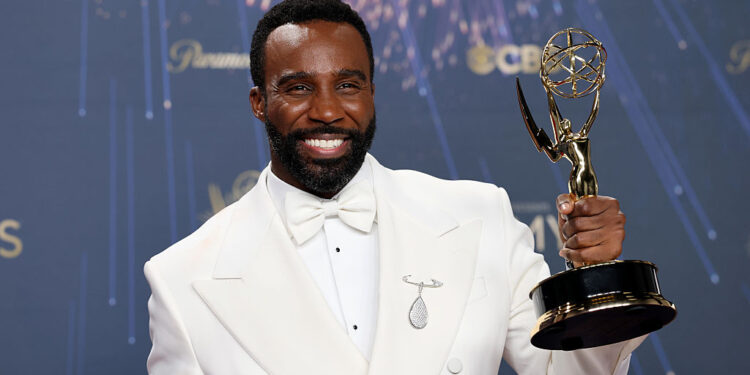
If you’ve ever watched Severance on Apple TV+, then you know that Tramell Tillman deserved to take home the Outstanding Supporting Actor in a Drama series. His portrayal of Seth Milchick, given that it was the last acting field to honor a Black actor in its 77-year history, made it that much sweeter. He deserved it this season for his body of work. But two things will forever make him legendary, if you know Severance. “Choreography and Merriment” was an epic display of his character, Milchilck, displaying a bit of his “outie” and “devour feculence,” which I will explain more about later.
Table of Contents
Tillman’s Speech
The 40-year-old, who grew up in Prince George’s County, Maryland, strode up to the podium decked out in head-to-toe white.
“You remember what you want to remember. You make time for what you want to make time for. Do the work. Show up. And most importantly, for the love of God, don’t embarrass me in public,” he exclaimed.
My first acting coach was tough, y’all, but all great mothers are. Momma, you were there for me when no one else was, and no one else would show up. Your lovingkindness stays with me. And this is for you,” he continued.
Thank you to the Academy. I am full, I am honored, I am humbled, and as my momma would say, Woo, look at God.”
What You Should Know About Severance
In the not-too-distant future, workers have the option of having a brain implant installed that separates their work and home lives. Their work and home life memories are entirely separated. They have no idea what they do at work.
Gamerant describes it succinctly: “The terms they use to differentiate their two selves are ‘innie’ (work self) and ‘outie’ (home self). With the implant, their outie arrives at Lumon, boards the elevator to go down to the Severed Floor (located just above the basement), and during the elevator trip, their brain switches to the consciousness of their innie.”
The four main characters, Marc, Dylan, Irving, and Helly, work in a department at Lumon. Tillman is their supervisor, Seth Milchick. He is a company man through and through in Season One. In Season Two, part of his veneer starts to crumble.
Even Tillman Doesn’t Know That Much about Milchick
In an interview with The Breakdown, Tillman talked about the interview process for the role. “I remember Ben [Stiller] telling me even before I got the role, ‘This guy could be mean, and this guy could be nice.’ Okay, great. I don’t know how much to do with that.”
Trimmel identifies multiple roles he plays as the supervisor: teacher, mentor, enforcer, and, above all, his absolute devotion to Lumon.
“There is something that Lumon gives him that he can’t get anywhere else, and what that is has not been established yet, and that’s the fun of it,” Trimmel said.
But he equates the character he plays with a cult-like devotion to the work.
The Things That Bring Milchick Close to Cracking Mirror Our Real Lives
His character’s performance review felt like another day as an articulate Black person in corporate America, but more treacherous.
Afrodiza has broken down the character and compared it to what it is like for us in corporate environments. You don’t have to watch the series to relate.
[embedded content]
But Yet, Trimmel Made Sure That the Marching Band Was an HBCU
Trimmel had a standout episode in Season 1, Episode 7, in which he lets loose and does a funky dance with the team, inspired by the “Music Dance Experience.” The actor didn’t necessarily want to make dancing a “thing.”
However, when director Ben Stiller came to the season finale and talked to him about his idea of a marching band, Tillman saw an opportunity. If he had his choice, it would be an HBCU-style band, and he would be the drum major.
“I went to two HBCUs, and one of them was Jackson State University. They housed the Sonic Boom of the South, one of the best marching bands in the country, and I would watch them during my undergrad years with such awe and amazement in the athleticism, the creativity, and the passion that these musicians and dancers served with,” he told Variety.
At least in that moment, he could find joy in the character he was playing. And we found joy in celebrating his accomplishments.
[embedded content]
























